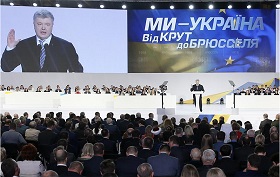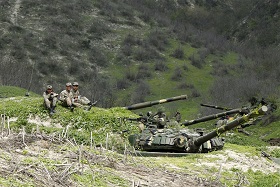2019 marks the 10th anniversary of the Eastern Partnership, a political initiative the EU launched in 2009 for developing relations with six eastern countries of the former socialist bloc. The collaboration program with Armenia, Azerbaijan, Belarus, Georgia, Moldova and Ukraine was primarily intended as a means for introducing these countries to the European experience and approaches to developing their economies, political institutions and civil society. Given current events, however, Russia has a highly negative perception of the EU’s policies concerning the Eastern Partnership, viewing them with an utmost mistrust, while this program’s results have so far fallen short of expectations.
The program’s 10th anniversary allows Europe to draw some interim conclusions and attempt to modify the agenda. The experience has thus far proved that the development of each member state of the Partnership is unique, which makes collaboration based on identical standards and measures challenging.
On the other hand, as soon as Russia began to oppose the European discourse on the domination of European values in these countries, almost immediately, the EU started shaping the image of an “aggressive Russia” striving to expand its area of influence.
The Eastern Partnership countries face a difficult choice between the European and Russian development tracks. Such opposing policies have resulted in some countries joining the confrontation between the two poles, thus becoming a buffer zone between them, while some states prefer to be outside observers and strive to create a venue for potential collaboration between the opposing parties.
2019 marks the 10 th anniversary of the Eastern Partnership, a political initiative the EU launched in 2009 for developing relations with six eastern countries of the former socialist bloc. The collaboration program with Armenia, Azerbaijan, Belarus, Georgia, Moldova and Ukraine was primarily intended as a means for introducing these countries to the European experience and approaches to developing their economies, political institutions and civil society. Given current events, however, Russia has a highly negative perception of the EU's policies concerning the Eastern Partnership, viewing them with an utmost mistrust, while this program’s results have so far fallen short of expectations.
The program’s 10 th anniversary allows Europe to draw some interim conclusions and attempt to modify the agenda. The experience has thus far proved that the development of each member state of the Partnership is unique, which makes collaboration based on identical standards and measures challenging.
On the other hand, as soon as Russia began to oppose the European discourse on the domination of European values in these countries, almost immediately, the EU started shaping the image of an "aggressive Russia" striving to expand its area of influence.
The Eastern Partnership countries face a difficult choice between the European and Russian development tracks. Such opposing policies have resulted in some countries joining the confrontation between the two poles, thus becoming a buffer zone between them, while some states prefer to be outside observers and strive to create a venue for potential collaboration between the opposing parties.
The power of values and discourse
Considering the situation in terms of the theory of discourse (M. Foucault), we see that broadcasting one’s values is far from a harmless practice. At some point, the gift of democratic and liberal values will transform into a carefully thought-through strategy for expanding power onto new territories. In the information dominated world of today, those who set the discourse framework determine the rules of the game and run the situation. So the objective of each centre is to spread their value models and practices as broadly as possible.
We should also take into account the overall tendency of European civilization to proselytize and promulgate its value models.
That has been its invariable behavioural strategy in the international arena since the time of the great European empires. Eurocentrism, otherwise known as the rejection of other cultures and perception of foreign practices as barbaric and uncivilized, still exists in Europe today in various forms.
Our European partners broadcast their values within the framework of the Eastern Partnership as part of aiding more institutionally backward countries. Essentially, in a crisis, more powerful actors introduce their rules of the game to draw new resources and territories into their area of influence. Simultaneously, an unattractive image of the opponent is created. Russian and European media have been doing this for the last five years.
The Eastern Partnership is a war of values and institutional systems
Robust European economic development throughout the 20th century is the basis of the appeal of European democratic institutions. Favourable living conditions, a free creative environment, and understandable, yet strict rules of life attract the best minds from developing countries. Cooperation with Europe opens the way to institutional innovation and knowledge but does not guarantee security and protection of national interests for, in particular, Armenia (Nagorno-Karabakh) and several Balkan states.
At the same time, Russia perceives the Eastern Partnership as Europe's geopolitical project aimed at expanding its influence. Yet several experts believe that Europe today is not in conflict with Russia, with the central conflict being between Russia and the US. Nonetheless, this underlines a legitimate question as to whether the EU is capable of developing its own geopolitical strategy.
When the project was planned in 2009, an entirely different picture of the world and outlook were constructed. Back then, the planning did not account for China’s growing role or the influence of the Islamic factor. These ascendant international forces do not see any distinct differences between Russia and Europe. China’s growing global power and the spread of Islam (particularly of its radical forms) can become common challenges that Europe and Russia will have to think about combating together.
In 2009, Russia’s view of the situation was not taken into account or only one-sidedly; today, Russia's proactive position has come as a great surprise for many in Europe. Moscow demands that its opinion and interests be taken into account, and they do not fit well into the old model of the Eastern Partnership.
The experience of implementing the program has demonstrated that joining the Eastern Partnership in no way means that the journey will be wholly positive. Europeans blame integration failures on the intense pressure exerted by Moscow on some countries’ leaders. Despite that, the Partnership countries are now themselves, too, in the process of choosing a collaboration formula. Generalizing current experience, we can identify the Partnership states’ two basic strategies concerning the two opposing poles, Russia and the West: the buffer zone strategy or the dialogue platform strategy.
The buffer zone is a situation of confrontation between the poles of influence when they are engaged in conflict on their periphery, without involving their resources. We see this in the open conflict in the Donbass, when passionate radicals find no outlet for their energy at home and are willing to take part in military gambles in a neighbouring state. Take, for instance, Moldova, where the outcome of the people’s political choice depends on who supports the candidate, Russia or Europe. In Georgia, success in domestic politics also largely depends on the elite’s foreign political preferences. Buffer countries have chosen a zero-sum game strategy, betting on one player only and thus putting themselves in a more vulnerable position. If their chosen side loses, they also lose.
The bridge metaphor has not taken root, and experts lean somewhat toward the platform for dialogue metaphor. Belarus is active here, providing a venue for the peace talks on the Donbass; Armenia acts as a prototype testing range for EU–EAEU economic cooperation; Azerbaijan, which was, until recently, a closed state geared toward its prosperity, is another example. The position of a platform for dialogue is stronger and more stable in the long term, though it is costlier to implement this strategy. The transaction costs involved are rather high.
Non-zero sum game
Currently, EU–Russia relations concerning the Eastern Partnership countries are stuck in the zero-sum game mode: the “West or Russia” choice cuts off many additional opportunities for these countries. With the US actively intervening in European processes, no-one is insured against the negative-sum game scenario unfolding.
Armenia has taken realistic stock of the situation and is seeking options for cooperating with the two regional associations on mutually beneficial terms. Belarus is pursuing a similar policy. Such actions prompt frequent media attacks on the states concerning "cooperation with the West" or "cooperation with Russia."
Europe’s expert community is gradually developing a concept of the importance of studying and understanding Russia’s position and Russian discourse. Since sanctions bring economic difficulties but do not influence Russia's political and social climate, while confrontation results in nothing but mutual losses, the need to seek alternative ways to collaborate is becoming imminent.
Moving toward a non-zero sum game appears to be the most favourable outcome. Yet there can be no way out of confrontation without implementing a specific dedicated policy. I will outline several possible steps that are already being mentioned in expert discussions. First, one should focus on fact-based rather than stereotype-based knowledge of each other. In this respect, developing EU studies in Russia and Russian studies in Europe is the desired format for restoration and development. Second, expert knowledge should not be obstructed if it draws conclusions that do not fit perfectly into the general propaganda framework. Third, when making a specialist assessment, findings must be called into question, and non-standard solutions must be sought. It is useful to compare discourses used by Russians and Europeans to denote the same facts. Imposing one's expert opinion will not bring positive results, even if this is initially successful.
Additionally, a separate important task is to seek common goals for Europe and Russia. The experience of cooperating in the Arctic demonstrates that Russia and Europe can interact effectively in the face of a common threat. Finally, in the future, it will benefit all parties to create venues for dialogue in the Eastern Partnership countries. In this situation, Eastern European countries will undoubtedly compete to be the best and most convenient such venue. Growing competition will result in improved quality and reduced transaction costs. Such venues may also become specialized. Negotiation hubs on various issues, with a developed infrastructure and expert support, constitute a somewhat favourable alternative to buffer zones in an armed and political confrontation. For the Eastern Partnership countries, it will mean developing education and further training programs in negotiating practices. As a result, instead of buffers, states can become regional and global confidence-growth points.
1. Implicit (tacit) knowledge is an integral part of a person or a group of persons. This knowledge is difficult to describe and convey in formalized rules and guidelines. This knowledge is obtained through experience or joint activities.








